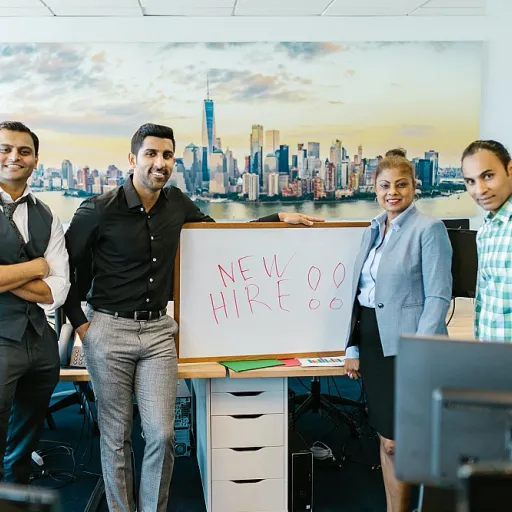
Understanding the concept of manufacturing experience
Defining Manufacturing Experience for Employees
Manufacturing experience is more than just time spent on a factory floor. It refers to the practical knowledge and skills gained while working in various manufacturing roles, from entry level jobs to advanced manufacturing positions. Employees in this sector interact with production processes, machine operation, quality control, and often, emerging technologies like automation and CNC machinery. This hands-on experience shapes how workers approach problem solving, adapt to new technology, and contribute to the overall quality of products.
Why Manufacturing Experience Matters
For many, a manufacturing career offers a unique blend of specialized training and transferable skills. Employees develop a keen understanding of production, safety protocols, and the importance of quality in every step of the process. These skills are not only essential for success in manufacturing jobs but also provide a competitive edge in other industries. As manufacturing evolves with technology, workers gain exposure to modern manufacturing practices and automation, preparing them for future roles and career growth.
Hands-On Learning and Career Development
One of the defining aspects of manufacturing experience is the opportunity for hands-on learning. Training programs and on-the-job experience help employees build expertise in machine operation, quality control, and specialized roles. This practical knowledge is crucial for those seeking to advance in their manufacturing career or transition into more specialized or supervisory positions. The experience gained in these environments often leads to a deeper understanding of production processes and the ability to adapt to new challenges.
Manufacturing experience also plays a key role in shaping workplace culture and employee well-being. The way teams collaborate, solve problems, and support each other can have a significant impact on job satisfaction and long-term career growth. For a deeper look at how group-oriented approaches influence positive employee experiences, you can read more about group-oriented heroes in the workplace.
Key skills developed through manufacturing experience
Building a Foundation of Technical and Transferable Skills
Manufacturing experience gives employees a unique blend of technical and transferable skills that are highly valued in today’s job market. Whether someone is starting in entry level roles or moving into advanced manufacturing positions, the skills gained on the production floor can shape a successful career in manufacturing and beyond.
- Technical know-how: Hands-on experience with machine operation, CNC technology, and automation is essential for many manufacturing jobs. Workers learn to operate, maintain, and troubleshoot specialized equipment, which is critical for efficient production processes.
- Quality control: Employees develop a keen eye for detail and a strong sense of responsibility for product quality. Understanding quality standards and participating in quality control checks are central to many manufacturing roles.
- Problem solving: Manufacturing environments often require quick thinking and creative solutions. Workers regularly face challenges that demand analytical skills and adaptability, making problem solving a core part of the job.
- Process improvement: Experience in manufacturing helps employees identify inefficiencies and suggest improvements. This mindset is valuable for organizations aiming to stay competitive and adopt emerging technologies.
- Teamwork and communication: Production processes rely on collaboration. Employees learn to communicate clearly, work in teams, and coordinate with colleagues across different roles and shifts.
These skills are not only essential for manufacturing jobs but are also highly transferable to other industries. For example, attention to detail, technical troubleshooting, and process optimization are valued in logistics, technology, and even healthcare settings.
Specialized Training and Career Growth
Many manufacturing roles offer structured training programs that help employees develop specialized skills. These programs can cover advanced manufacturing techniques, new production technologies, or safety protocols. Gaining hands-on experience through these programs gives workers a competitive edge and prepares them for future roles in the industry.
As manufacturing continues to evolve with automation and digital transformation, employees who invest in learning new technologies and processes position themselves for career growth. The experience gained in modern manufacturing environments opens doors to specialized roles and leadership opportunities, making it a strong foundation for a long-term manufacturing career.
Challenges faced by employees in manufacturing environments
Common Obstacles in Manufacturing Environments
Employees in manufacturing jobs encounter a unique set of challenges that shape their daily work and long-term career paths. The nature of production processes, the need for specialized skills, and the rapid adoption of automation and emerging technologies all contribute to a demanding work environment. Understanding these obstacles is essential for anyone considering a career in manufacturing or seeking to support workers in these roles.
- Physical Demands and Safety Risks: Many manufacturing roles require hands-on experience with machine operation, repetitive tasks, and sometimes heavy lifting. Even with advanced manufacturing and automation, workers must remain vigilant about safety protocols to minimize accidents and injuries.
- Adapting to Technology: As modern manufacturing evolves, employees must keep pace with new technology, such as CNC machines and automated production lines. This shift can be challenging, especially for those in entry level roles who may need additional training programs to develop essential and transferable skills.
- Quality Control Pressures: Maintaining high standards of quality is critical in manufacturing. Workers are often under pressure to meet production targets while ensuring that each product meets strict quality control requirements. This balance can lead to stress and requires strong problem solving abilities.
- Repetitive Work and Job Satisfaction: Some manufacturing jobs involve repetitive tasks, which can impact job satisfaction and employee well-being. Rotating roles and upskilling opportunities are important for keeping workers engaged and motivated.
- Shift Work and Work-Life Balance: Manufacturing facilities often operate around the clock, requiring employees to work in shifts. Irregular hours can affect work-life balance and overall well-being, making it important for organizations to support their workforce through flexible policies and supportive workplace culture.
Despite these challenges, manufacturing experience offers valuable transferable skills and a competitive edge for future career growth. As the industry continues to embrace automation and advanced technologies, the ability to adapt and learn new processes becomes even more essential. For a deeper look at how inclusion and evolving workplace trends are shaping the future of manufacturing, explore this future of inclusion in manufacturing resource.
The role of workplace culture in manufacturing
How Culture Impacts Daily Work and Collaboration
Workplace culture in manufacturing environments is more than just a background factor—it shapes how employees interact, solve problems, and approach their jobs. A positive culture encourages teamwork and open communication, which are essential for handling complex production processes and adapting to new technology. In contrast, a negative culture can make it harder for workers to share ideas, develop skills, or feel valued in their roles.
Safety, Quality, and Continuous Improvement
Manufacturing jobs often involve hands-on experience with machines, automation, and advanced technology. A culture that prioritizes safety and quality control helps employees feel secure and motivated to maintain high standards. This focus on quality also supports ongoing training programs, which are vital for developing specialized skills and staying competitive in modern manufacturing.
- Safety-first mindset: Reduces accidents and builds trust among workers.
- Commitment to quality: Encourages attention to detail and pride in production outcomes.
- Continuous improvement: Fosters problem solving and innovation, giving employees a competitive edge.
Supporting Career Growth and Transferable Skills
A supportive workplace culture recognizes the importance of career growth and the development of transferable skills. Whether employees are in entry level roles or specialized positions like CNC machine operation, a culture that values learning and advancement helps them prepare for future opportunities. This is especially important as emerging technologies reshape manufacturing roles and create new paths for career manufacturing.
Ultimately, the culture within manufacturing environments plays a crucial role in shaping the employee experience, influencing everything from job satisfaction to the ability to adapt to change. When organizations invest in a positive culture, they not only improve production outcomes but also support the well-being and future success of their workers.
Opportunities for growth and advancement
Pathways to Advancement in Manufacturing
Manufacturing experience opens up a wide range of career growth opportunities for employees at all stages. Whether starting in entry level roles or moving into more specialized positions, workers can build a solid foundation for advancement by developing essential skills and gaining hands-on experience with production processes and modern technology.- Training programs: Many manufacturing jobs offer structured training programs that help employees master machine operation, quality control, and automation. These programs not only improve job performance but also make workers more competitive for higher-level roles.
- Transferable skills: Skills such as problem solving, teamwork, and adaptability are highly valued across manufacturing roles. Employees who demonstrate these abilities can transition into advanced manufacturing or supervisory positions, or even shift to different industries.
- Specialized roles: As technology evolves, new specialized roles emerge in areas like CNC machining, robotics, and process optimization. Employees with experience in these areas often find themselves in high demand, with opportunities for increased responsibility and pay.
Building a Future-Proof Career
The manufacturing sector is constantly changing due to automation and emerging technologies. Workers who stay up to date with the latest production techniques and invest in continuous learning position themselves for long-term career growth. Participating in ongoing training, earning certifications, and seeking out challenging projects can give employees a competitive edge in the job market.| Opportunity | How It Supports Career Growth |
|---|---|
| Quality control expertise | Leads to roles in management and process improvement |
| Advanced machine operation | Opens doors to specialized and higher-paying jobs |
| Experience with automation | Prepares workers for future manufacturing jobs |
How manufacturing experience shapes employee well-being
Impact on Mental and Physical Well-being
Manufacturing experience shapes employee well-being in several ways. The hands-on nature of manufacturing jobs, whether in entry level roles or advanced manufacturing, means workers are often on their feet, operating machines, or monitoring production processes. This physical activity can be rewarding, but it also brings challenges. Repetitive tasks, shift work, and the need for constant attention to quality control can lead to fatigue and stress if not managed well.
Job Satisfaction Through Skill Development
Many employees find satisfaction in acquiring specialized skills, such as CNC machine operation or automation technology. The sense of achievement from mastering complex processes or contributing to high-quality production can boost morale. Training programs and opportunities to move into more specialized roles help workers feel valued and invested in their manufacturing career.
Workplace Safety and Support Systems
Safety is essential in manufacturing environments. Companies that prioritize safety protocols and provide proper training contribute to a healthier work atmosphere. Supportive workplace cultures, as discussed earlier, encourage open communication and teamwork, which can reduce stress and improve overall well-being.
Career Growth and Its Effect on Well-being
Opportunities for career growth, such as moving from entry level to supervisory or specialized roles, play a significant role in employee happiness. Knowing there is a path forward—whether through learning new technologies or taking on more responsibility—gives workers a sense of purpose and stability. This is especially true in modern manufacturing, where emerging technologies create new roles and require transferable skills.
Balancing Demands and Rewards
- Physical demands can be high, but proper ergonomics and breaks help maintain health.
- Problem solving and teamwork foster a sense of accomplishment.
- Recognition for quality work and innovation supports mental well-being.
Ultimately, manufacturing experience can provide a competitive edge for employees, not just in skills and career advancement, but also in personal growth and resilience. The key is a balanced environment where training, support, and opportunities for advancement are available to all workers.













